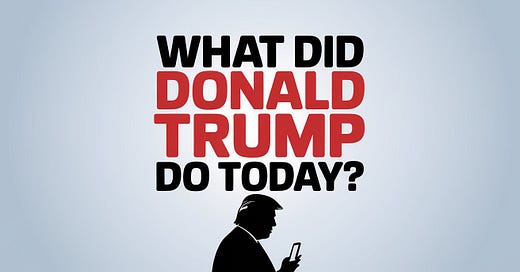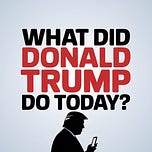Over the weekend, Donald Trump’s Truth Social activity revealed a troubling mix of misinformation, conspiracy theories, and authoritarian rhetoric. His post about the presidential “autopen” being part of a criminal plot to rig the 2020 election rehashed discredited claims and undermined public trust in democracy. Trump continued to assert, without evidence, that he won the election by millions of votes. He also attacked Walmart for linking price hikes to tariffs, displaying a poor grasp of economic fundamentals by suggesting the company should absorb the cost despite basic supply chain realities. In foreign policy, Trump claimed personal credit for upcoming calls with Vladimir Putin and Volodymyr Zelenskyy to discuss a ceasefire, presenting diplomacy as a performance rather than a coordinated, multilateral effort. He criticized Fed Chair Jerome Powell for not cutting interest rates fast enough and promoted the debunked “Clinton Body Count” conspiracy, further fueling dangerous and defamatory narratives.
Trump’s attacks on ABC News and its parent company Disney, paired with false claims of a $16 million legal victory against journalist George Stephanopoulos, exemplified his strategy of intimidation and media distortion. His justification of a Boeing 747 donation from Qatar lacked transparency and misrepresented the ethical concerns surrounding the gift. Most notably, Trump issued what sounded like veiled threats to ABC, escalating his ongoing attacks on press freedom.
Secretary of State Marco Rubio, in a CBS interview, echoed the administration’s incoherent foreign policy. While initially welcoming Vatican mediation between Ukraine and Russia, he quickly backpedaled on U.S. strategy and issued ambiguous statements about Russia’s intentions. His rejection of intelligence assessments regarding the Venezuelan gang Tren de Aragua, in favor of FBI claims, suggested ideological motives over factual analysis. Rubio’s selective empathy toward white Afrikaner refugees contrasted sharply with the administration’s harsh treatment of other asylum seekers, revealing racial bias in immigration policy. His comments on Gaza, Iran, and global diplomacy leaned heavily on euphemism and deflection, lacking substantive detail or principled consistency.
In an interview with CNN’s Jake Tapper, Treasury Secretary Scott Bessent offered evasive, often incoherent defenses of the administration’s economic policies. He dismissed concerns about the U.S. credit downgrade and deflected questions about inflation and tariffs with vague or misleading statements. His claim that tariffs were not hurting consumers contradicted clear economic evidence. On the controversy surrounding Qatar’s luxury jet donation, Bessent made ahistorical comparisons that failed to address legitimate ethical questions, reinforcing a broader pattern of deflection over accountability.
Meanwhile, an interview on Fox News with FBI Director Kash Patel and Deputy Director Dan Bongino served as a partisan spectacle. The two officials framed the FBI as a corrupt institution now being “cleansed” under Trump’s leadership. Their inflammatory rhetoric, dehumanizing language, and lack of policy clarity suggested an agency operating on loyalty and political narrative rather than legal principles. Despite claims of reform and transparency, they offered little substance and instead promoted conspiracies and grievances, with the interviewer providing no meaningful scrutiny.
Together, these media appearances and social media posts depict an administration steeped in conspiracism, performative governance, and political retribution. They reflect a government increasingly untethered from democratic norms, institutional checks, and evidence-based policy, favoring spectacle and loyalty over substance and accountability.













Share this post